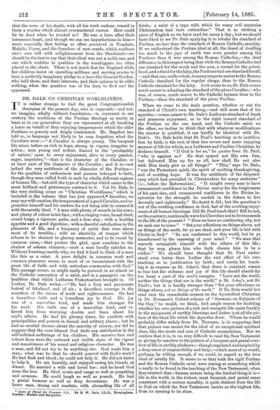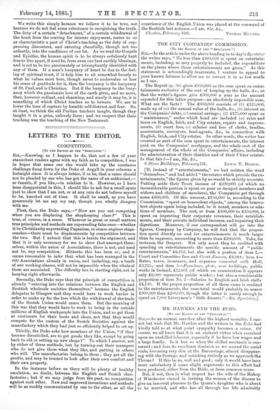DR. DALE ON CHRISTIAN WORLDLINESS.
IT is rather strange to find the great Congregationalist champion of the present day, who is supposed,—and not, we imagine, wholly without foundation,—to represent in our century the traditions of the Puritan theology as nearly at least as in our generation they are represented at all, breaking a lance on behalf of that enjoying temperament which the older Puritans so gravely and deeply condemned. Mr. Bagehot has told us, in language not likely to be soon forgotten, what the Cavaliers were :—" A Cavalier is always young. The buoyknt life arises before us rich in hope, strong in vigour, irregular in action ; men young and ardent, framed in the 'prodigality of nature,' open to every enjoyment, alive to every passion, eager, impulsive,"—that is the character of the Cavalier, or at least part of the character of the Cavalier ; and it is—not indeed the very antithesis of the character of the Puritan— for the qualities of enthusiasm and passion belonged to both, though they were called forth in each by wholly different regions of human life,—but still the type of character which seems in the most brilliant and picturesque contrast to it. Yet Dr. Dale, in the very striking essay on " Christian Worldliness," which is included in the volume that has just appeared,* describes, we may say with unction, the temperament of a good Cavalier, and reproaches himself and his readers for not being able to connect it with the saintly ideal. " A man with plenty of muscle in his arms, and plenty of colour in his face ; with a ringing voice, broad chest, sound lungs, a vigorous pulse, and a firm step ; with a healthy appetite and a good digestion ; with a cheerful satisfaction in the pleasures of life, and a buoyancy of spirit that rises above most of its troubles ; with an elasticity of temper which refuses to be chained to gloomy memories, and to be vexed by common cares,—that prefers the glad, open sunshine to the shadow of solemn cloisters,—such a man hardly satisfies us. Without knowing exactly why, we find it hard to think of a man like this as a saint. A pure delight in common work and ,common pleasures seems to most of us inconsistent with the great life of faith and with unbroken communion with God." This passage occurs, as might easily be guessed, in an attack on the Catholic conception of a saint, and in a panegyric on the healthier ideal which Lutheran Protestantism brought in. Of Luther, Dr. Dale writes :—" He had a fiery and passionate hatred of falsehood and of sin ; a dauntless courage in the assertion of the claims of truth and righteousness. He had a boundless faith and a boundless joy in God. His joy was of a masculine kind, and made him stronger for his work. His faith was of a masculine kind, and relieved him from worrying doubts and fears about his soul's affairs. He had his gloomy times, his conflicts with principalities and powers in dismal and solitary places ; but he had no morbid dreams about the sanctity of misery, nor did he suppose that the ever-blessed God finds any satisfaction in the self-inflicted sufferings of his children. His massive face and robust form were the outward and visible signs of the vigour and massiveness of his moral and religious character. He was a man, and did not try to be anything else. God made him a man ; what was he that he should quarrel with God's work P He had flesh and blood ; he could not help it. He did not desire to help it. He ate heartily, and enjoyed seeing his friends at dinner. He married a wife and loved her ; and he loved God none the less. He liked music and songs as well as preaching and sermons. He could laugh as well as preach. He had a genial humour as well as deep devoutness. He was a brave man, strong and resolute, with abounding life of all
kinds; a saint of a type with which for many evil centuries Christendom had been unfamiliar." That is as striking a piece of English as we have read for many a day ;. but we should have liked to see Dr. Dale applying it to rebuke the standard of Puritan, no less than the standard of Roman Catholic, sanctity. If we understand the Puritan ideal at all, the dread of dwelling too much in the joys of earth was even greater among the Puritans than it was among the Roman Catholics,—the chief difference in this respect being that while the Roman Catholics had one standard for the monk and the nun, a second for the priesthood, and a third for the laity, the Puritans had one standard for all, —and that one, on the whole, in many respects nearer to the Roman Catholic standard for the regular clergy, than to the Roman Catholic standard for the laity. As it seems to us, Dr. Dale comes much nearer to adopting the standard of the pious Cavalier,—who was, of course, much nearer to the Catholic layman than to the Paritan,—than the standard of the pious Puritan.
When we come to the main question, whether or not the standard of Christ's own teaching,—and still more that of his apostles,—comes nearer to Dr. Dale's Lutheran standard of frank and generous enjoyment, or to the rigid inward standard of the Puritan on the one hand, and the Catholic saint on the other, we incline to think that with whatever modifications the answer is qualified, it can hardly be identical with Dr. Dale's. Dr. Dale holds that St. Paul's teaching as to justification by faith, is the root of that less severe and more enjoying manner of life for which, as a Lutheran and Pauline Christian, he declares himself. "If God is for us," he quotes from St. Paul, "who is against us ? He that spared not His own Son, but delivered Him up for us all, how shall He not also with Him freely give us all things ?" "This," says Dr. Dale, "was the Protestant spirit, the spirit of exulting thanksgiving, and of exulting hope. It was the antithesis of the despondency which had prevailed in Christendom for many centuries" [i.e., before the Reformation]. " It taught every man to have unmeasured confidence in the Divine mercy for the forgiveness of his past sins, and unmeasured confidence in the Divine inspiration for the strength he needed in the future to live devoutly and righteously." No doubt it did ; but the question is not of the exulting confidence in God, but of the exulting enjoyment of all human blessings. Did St. Paul teach that? Did he not, on the contrary, continually warn his Churches not to live too much in the life of the present ? " Here we have no continuing city, but we seek one to come." " Set your affections on things above, not on things of the earth, for ye are dead, and your life is hid with Christ in God." " Be not conformed to this world, but be ye transformed by the renewing of your mind." " No man that warreth entangleth himself with the affairs of this life ; that he may please him who hath chosen him to be a soldier." We should have thought that St. Paul understood even better than Luther the real effect of his own teaching as to justification by faith ; and surely his teaching is as express as St. John's, that there is constant reason to fear lest the richness and joy of this life should absorb far too large a part of the soul's energies. "Love not the world, neither the things that are in the world," is St. John's, not St. Paul's ; but it is hardly stronger than " Set your affections on things above, not on things of the earth." If Dr. Dale would but read over the remarkable sermon on the Apostolical Christian in Dr. Newman's Oxford volume of " Sermons on Subjects of the Day," he would, we think, find ample reason for doubting whether his own picture of a rich and energetic life spent frankly in the enjoyment of earthly blessings and duties is at all the picture of the ideal life which the Apostles drew. Where he would probably differ widely from Dr. Newman, is in supposing that that picture was meant for the ideal of an exceptional spiritual class, like the monk and nun of Catholic monasticism. But we confess that it is, to us, very difficult to read the New Testament as giving its sanction to the picture of a buoyant and genial overflow of life in earthly gladness,—though regulated andinspired by a deep sense of responsibility and duty,—which most of us would, perhaps, be willing enough, if we could, to regard as the true ideal of saintly life. It seems to us that both the rigid Puritan and the Roman Catholic saint were aiming at something which is really to be found in the teaching of the New Testament, when they insisted that—human nature being the limited thing it is— life in the world, in the richest, most buoyant, and genial sense consistent with a serious morality, is quite distinct from the life in God on which the New Testament insists as the highest life, from its opening to its close. We write this simply because we believe it to be true, not because we do not feel some reluctance in recognising the truth. The duty of a certain " detachment," of a certain withdrawal of the heart from the craving for intense enjoyment, seems to us as characteristic a part of Christ's teaching as the duty of suppressing discontent, and entering cheerfully, though not too ardently, into the conditions of our lot. As we read the Gospels and Epistles, the human spirit is to be always sedulously kept free to live apart, if need be, from even our best earthly blessings, and is not to be too passionately or triumphantly identified with any of them. If a man's buoyancy of heart be due to the feeling of spiritual trust, if it help him to sit somewhat loosely to what he values most here, though never to undervalue or lose his sense of gratitude for it, then the buoyancy is the buoyancy of St. Paul, and is Christian. But if the buoyancy be the buoyancy which the passionate love of the earth gives, and no more, then, however radiant, and charming, and manly it may be, it is something of which Christ teaches us to beware. We are to lower the tone of rapture by humble self-distrust and fear. So, at least, we think the old Puritan teachers taught, though they taught it in a grim, unlovely form ; and we suspect that their teaching was the teaching of the New Testament.



































 Previous page
Previous page